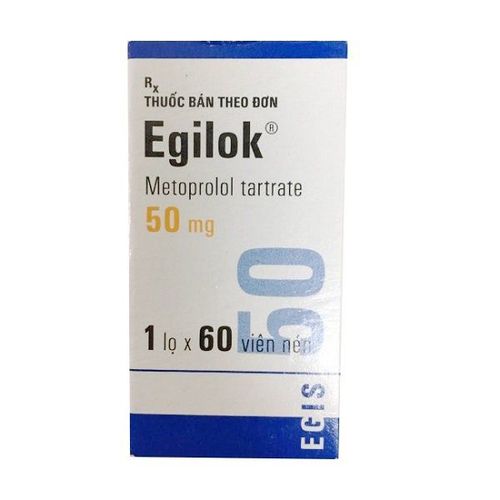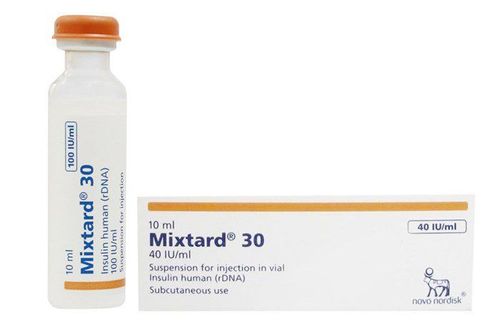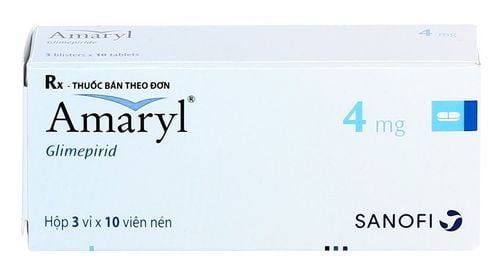This is an automatically translated article.
Duaryl medicine has the main active ingredient Glimepiride 4mg and other excipients in a sufficient amount. Duaryl belongs to the group of hormone drugs, which are effective in the treatment of type 2 diabetes.
1. What is Duaryl?
Duaryl drug has the main active ingredient Glimepiride 4mg and other excipients in sufficient quantities. Duaryl belongs to the group of hormonal drugs, which are used to treat type 2 diabetes.
Duaryl drug is made in the form of tablets, suitable for direct oral use. Packing is a box of 3 blisters and each blister contains 10 pills.
1.1. Pharmacodynamics of the active ingredient Glimepiride Oral antidiabetic drug (A: digestive system and metabolism).
1.2. Pharmacokinetics of the active substance Glimepiride: Absorption: The active substance Glimepiride is fully bioavailable. Food does not significantly alter the absorption of this drug, however the rate of absorption is slightly slowed. Maximum plasma concentrations (Cmax) are reached approximately 2 hours and 30 minutes after dosing. Distribution: Glimepiride has a very low volume of distribution. The elimination half-life, calculated from measured serum concentrations after repeated administration, is between 5 and 8 hours. However, when the drug is used in high doses, a longer half-life has been reported. Metabolism: Two metabolites formed in the liver were detected in both urine and feces. It is a hydroxy derivative and a carboxy derivative of the active ingredient Glimepiride. Elimination: Following oral administration of Glimepiride, the terminal half-lives of the metabolites are 3 to 6 hours and 5 to 6 hours, respectively.
2. What diseases does Duaryl treat?
Duaryl is used in combination with diet and exercise to control blood sugar in people with non-insulin-dependent type 2 diabetes.3. Usage and dosage of Duaryl
3.1. General principles of treatment Patients should use the lowest therapeutic dose that achieves the desired blood glucose level. The therapeutic dose must be initiated and monitored by the physician. You need to take the medicine at the right dose and at the right time as prescribed by your doctor. The treating doctor needs to tell the user in advance how to handle in case of violation of a specific treatment regimen such as forgetting to take a dose of medicine, forgetting a meal, or not being able to take the medicine on time. in prescription. Never make up for a missed dose by taking a higher therapeutic dose. If you find that you have taken a dose that is too high or taken an extra dose, you should notify your doctor immediately. The duration of treatment with Duaryl is usually long-term. 3.2. Dosage of Duaryl Therapeutic dose for adults: Initial dose for previously untreated individuals: 1-2 mg/day. People who are debilitated, malnourished or elderly, people with liver or kidney failure, people at risk of hypoglycemia: take 1mg/day; People who have been treated with other antidiabetic drugs: 1-2 mg/day, up to 2 mg/day. Maintenance dose: 1 - 4 mg/day (for those already taking glimepiride 1 mg/day, increase to 2 mg/day if desired blood glucose levels are still not reached after 1-2 weeks of treatment; after up to a dose of 2mg, subsequent dose adjustment depending on tolerability and response); should increase the therapeutic dose gradually, each increase should not exceed 2 mg/day, at intervals of 1-2 weeks; up to 8 mg/day. 3.3. How to use Duaryl Drug Duaryl drug is prepared in the form of tablets, suitable for direct oral use. You should take Duaryl once a day with breakfast or the first main meal of the day.
3.4. Adjusting the therapeutic dose of Duaryl The doctor will adjust the therapeutic dose of Duaryl in the following cases:
As insulin sensitivity improves when the disease is under control, the need for the active ingredient Glimepiride may be decrease with treatment after some time. To avoid hypoglycaemia, it is necessary to reduce the therapeutic dose or discontinue the drug in time. The weight of the person taking the drug may be altered. The lifestyle of drug users changes. Factors that can cause increased sensitivity to low or high blood sugar.
4. Undesirable effects of the drug Duaryl
During the use of Duaryl medicine, you may experience some specific undesirable effects as follows:
The most important undesirable effect is a decrease in blood sugar. Common undesirable effects include dizziness, dizziness, headache; nausea, vomiting, feeling of gas, bloating, pain in the epigastrium, abdominal pain, diarrhea; Temporary visual disturbances when starting Duaryl.
5. Interactions of Duaryl . drugs
Duaryl drugs can cause interactions with drugs such as:
When Duaryl is used together with insulin, oral diabetes drugs, chloramphenicol, coumarin derivatives, MAOIs, miconazole, phenylbutazone, -blocker increases the hypoglycemic effect. of the active ingredient Glimepiride. Concomitant use of Duaryl with Acetazolamide, diuretics, Barbiturates, Phenytoin, Glucagons reduces the effect of Glimepiride active ingredient. Duaryl drugs used together with antihistamines H2, clonidine, reserpine, alcohol: change the effect of the active ingredient Glimepiride. The active ingredient Glimepiride modifies the effect of the anticoagulant Coumarin.
6. Some notes when using Duaryl
6.1. Contraindications of Duaryl drug Duaryl is contraindicated in the following cases:
People with hypersensitivity or hypersensitivity to the active ingredient Glimepiride, Sulfonylurea or Sulfamide or any other ingredient of the drug. People with insulin-dependent diabetes, coma, and diabetic ketoacidosis. People with severe liver and kidney failure: Should switch to insulin. Pregnant and lactating women. 6.2. Notes and precautions when using Duaryl Do not use Duaryl for pregnant women and lactating women, children. Be aware of the risk of hypoglycemia or loss of blood sugar control Loss of blood sugar control can occur for people who are stable on a diabetes treatment regimen but have stressors. such as fever, trauma, infection, or surgical intervention. Allergic reactions: Allergic reactions have been reported during treatment with Glimepiride including hypersensitivity, angioedema, Stevens-Johnson syndrome. If an allergic reaction is suspected, the patient should promptly stop taking medications containing the active ingredient Glimepiride. Hemolytic anemia: Hemolytic anemia has been reported in individuals with or without glucose 6-phosphate dehydrogenase (G6DP) deficiency. Increased cardiovascular risk with all sulfonylureas: An increased cardiovascular risk has been reported with the use of oral hypoglycemic agents compared with diet alone or diet in combination with insulin. Low or high blood sugar, impaired vision can impair the ability to concentrate and react. Therefore, you need to pay attention when driving or operating machinery. Medicines containing the active ingredient Glimepiride, specifically Duaryl, should not be used in people with rare hereditary problems of lactose intolerance, total lactase deficiency or glucose-galactose malabsorption. Above is all information about Duaryl drug, patients need to carefully read the instructions for use, consult a doctor / pharmacist before using. Absolutely do not arbitrarily buy Duaryl medicine to treat the disease at home, because there may be unwanted side effects to health.
Follow Vinmec International General Hospital website to get more health, nutrition and beauty information to protect the health of yourself and your loved ones in your family.
Please dial HOTLINE for more information or register for an appointment HERE. Download MyVinmec app to make appointments faster and to manage your bookings easily.













